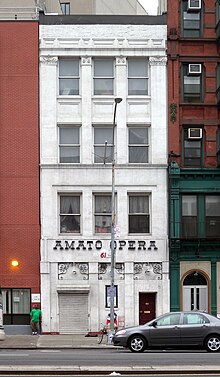Amato Opera: Difference between revisions
add "update after" template; add "refimprove" template; minor copyedit |
|||
| Line 1: | Line 1: | ||
{{refimprove|date=May 2009}} |
|||
[[File:Amato Opera 319 Bowery jeh.JPG|thumb|319 Bowery]] |
[[File:Amato Opera 319 Bowery jeh.JPG|thumb|The Amato Opera's home at 319 Bowery in [[New York City]], [[New York]], May 2009.]] |
||
The '''Amato Opera''' was an [[opera]] company located in [[New York City|New York |
The '''Amato Opera''' was an [[opera]] company located in the [[East Village, Manhattan|East Village]] neighborhood of the [[Manhattan]] [[borough (New York City)|borough]] of [[New York City]], [[New York]]. It is believed to be the only self-sustaining opera company in the [[United States]]. |
||
==Early years== |
==Early years== |
||
| Line 19: | Line 20: | ||
==Closure== |
==Closure== |
||
Amato Opera has announced that the company will close after May 31, 2009, with a performance of ''[[The Marriage of Figaro]]''. Anthony Amato made the announcement on January 10, 2009, before a performance of ''[[The Merry Widow]]''. He told ''[[The New York Times]]'', "Now, with Sally gone, I have decided that it is time for me to start a new chapter in my life".<ref>Wakin, Daniel J. [http://www.nytimes.com/2009/01/13/arts/music/13amat.html "Shock Greets Move to Close Amato Opera in May",] ''The New York Times'', January 12, 2009</ref> |
Amato Opera has announced that the company will close after May 31, 2009,{{update after|2009|6|1}}<!--flip tense to past tense (throughout article where needed; lead sentence was already changed...a tad premature) (may 30, 2009)--> with a performance of ''[[The Marriage of Figaro]]''. Anthony Amato made the announcement on January 10, 2009, before a performance of ''[[The Merry Widow]]''. He told ''[[The New York Times]]'', "Now, with Sally gone, I have decided that it is time for me to start a new chapter in my life".<ref>Wakin, Daniel J. [http://www.nytimes.com/2009/01/13/arts/music/13amat.html "Shock Greets Move to Close Amato Opera in May",] ''[[The New York Times]]'', January 12, 2009 (website requires registration)</ref> |
||
==Notes== |
==Notes== |
||
Revision as of 15:46, 30 May 2009
This article needs additional citations for verification. (May 2009) |

The Amato Opera was an opera company located in the East Village neighborhood of the Manhattan borough of New York City, New York. It is believed to be the only self-sustaining opera company in the United States.
Early years
The company was founded in 1948 by husband and wife team Anthony (b. 1920) and Sally Amato (27 September 1917–16 August 2000), with two goals in mind: to perform entertaining opera at a reasonable price; and to give promising singers experience with full-length productions. Anthony Amato, then the Director of the Opera Workshop at The America Theatre Wing, invested his own money to get the company started, using students from his opera classes. These early performances were free because union regulations would not allow them to charge admission. Instead, during the intermission the Amatos would "pass the hat around" for contributions.
While Anthony Amato acted as artistic director, selecting the productions, auditioning and casting, rehearsing and training the cast and conducting most of the performances, his wife Sally functioned as seamstress, light board operator, cook, box office manager, publicist, business manager, and, as Serafina Bellantoni, singer for the company until her death in 2000.
Their first production, Rossini's The Barber of Seville, was mounted in the auditorium of Our Lady of Pompeii Church at Bleecker and Carmine Streets, followed the next week by Mascagni's Cavalleria Rusticana and Leoncavallo's Pagliacci. The company used many other venues in its early days including the Kaufman Auditorium of the 92nd Street Y, the Fashion Institute of Technology, and Washington Irving High School auditorium.
In 1951, the company found its first permanent home at 159 Bleecker Street. They mounted one production each weekend, for fifty weeks a year, in the 299-seat theatre. Over 1,296 performances of 21 different operas were presented. Productions were occasionally presented in New London, New Haven and other nearby cities. In 1959 the Bleecker Street Theatre was closed, but performances continued at other locations including 126 West 23rd Street and The Town Hall.
Later years
In 1964 Amato Opera found a new permanent home in a four-story building, next to a gas station and near the famous rock club CBGB, at 319 Bowery at Second Street, a former Mission House and restaurant supply store, which was converted into a 107-seat theatre with a 20-foot stage, orchestra pit, rehearsal space, and storage for 55 sets.
Each season includes six different operas, typically a mix of comedies and tragedies. Performances of each opera run over five weekends with six to ten different casts. They also mount Saturday morning Opera-In-Brief performances. Aimed at children, the Opera-In-Brief performances are full-length short operas or abridged versions of longer operas interspersed with narration. Throughout its life the Amato company has maintained a policy of keeping prices low, charging only $1.80 a seat when it moved into its current building in 1964. By 1975 ticket prices were only $3-4. In 1990, at $35 for an orchestra seat ($30 for students, children, and seniors), ticket prices were still modest compared to those at larger opera houses.
Amato Opera has received commendations and awards from Mayors Abe Beame, Ed Koch and Rudy Giuliani, and the Amatos have been inducted into City Lore's Peoples' Hall of Fame, honored by the American Cultural Roundtable, and the Italian Heritage and Cultural Committee, in recognition for their contribution to the artistic life of New York City.
Closure
Amato Opera has announced that the company will close after May 31, 2009,[needs update] with a performance of The Marriage of Figaro. Anthony Amato made the announcement on January 10, 2009, before a performance of The Merry Widow. He told The New York Times, "Now, with Sally gone, I have decided that it is time for me to start a new chapter in my life".[1]
Notes
- ^ Wakin, Daniel J. "Shock Greets Move to Close Amato Opera in May", The New York Times, January 12, 2009 (website requires registration)
